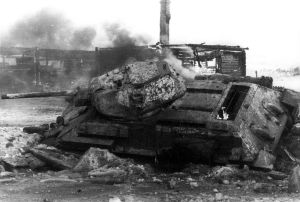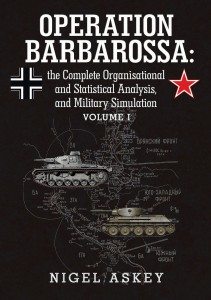Introduction
I had the pleasure of having some email correspondence with Nigel Askey, the author of http://www.operationbarbarossa.net/, and several works on the readiness and operations that occurred in the Eastern Front in 1941.
Issue – Operational Readiness vs Irrecoverable Losses
We had an interesting discussion on operational readiness, vice irrecoverable losses. Personally, I have had difficulties in understanding the German “irrecoverable” tank losses, and indeed their “irrecoverable” losses when compared to the change in their actions often do not appear to make sense. I asked myself if each nation defined all tank losses equivalently? Did the Germans and Allies have the same definition of “Beyond Economic Repair” and “irrecoverable” or were the Germans more willing to repair their tanks as the cost of shipping and repair was less then building a new tank? Were the allies more willing to simply replace a broken tank as it was cheaper then repairing?
Discussion – Loss in Readiness
In all of Nigel’s articles, he only ever uses ‘irrecoverable tank of AFV losses’. In this sense irrecoverable can be defined as ‘the vehicle is permanently destroyed or written off, or is captured by enemy forces’. When developing ROCP (Relative Overall Combat Proficiency) calculations he treats both sides both sides are treated the same (i.e. measuring irrecoverable losses only). Nigel defines the term ‘loss in readiness’ as something that could be corrected by internal supply and repair which contrast with irrecoverable losses which could not.

For example, if a unit with 100 tanks moves 100 miles from point A to B had 10 tanks break down so in simplistic terms the unit has only 90% of its tanks ‘operational’. This is without coming close to any enemy forces at all. The unit has not ‘lost’ 10 tanks at that point in time but lost 10% of its ‘operational readiness’. Depending on the ‘operational ROCP’ level of the unit (i.e. its trained support infrastructure) and the level of supplies and spares available, the unit will recover its readiness. A high ROCP unit will fully recover in a day, but a lower ROCP unit will recover much slower. No matter what a combat unit does, as soon it moves or attacks it will suffer significant operational readiness loss (and fatigue, which is a whole separate issue).
Therefore, in his view, in the early tank battles in Barbarossa, and indeed, up until Kursk when the Germans typically remained in control of the battlefield their tank losses were insignificant by there measure, but the operational effectiveness of their divisions greatly decreased. Nowhere is this more apparent then the initial weeks of Barbarossa. The German Panzer Divisions began at full strength, but by August, 5 short weeks latter, most Army Group Centre German Panzer Divisions tank elements were near, or below 50% due to a combination of combat and mechanical losses.
He postulates, that any individual unit report on its % operational readiness is almost useless in establishing any sort of ‘actual irrecoverable loss’. A unit continually defending against overwhelming forces had no choice but to remain even if its ‘operational readiness’ has drooped to almost zero. This would not necessarily mean the division has taken particularly heavy ‘irrecoverable losses’. This can only be determined by divisional strength reports, and replacement sent or/and received reports, to HQs at a later date.
Conclusion
In Nigel’s view, we should forget unit operational readiness loss percentages if you want to talk about irrecoverable losses. Especially if this is the only data available. You have to go beyond individual unit reports and short time frames to get the real numbers for battles and campaigns from higher level command reports (eg corps or higher, or totals over a campaign) over longer periods. I would like to express my thanks to Nigel Askey for his insights and sharing his opinion. While I may not completely agree with his view to only consider irrecoverable losses I believe that this discussion has provided me with a new perspective to consider and shown the knowledge and extent of consideration he has given to this issue.
With Sincere Thanks,
-AR-
